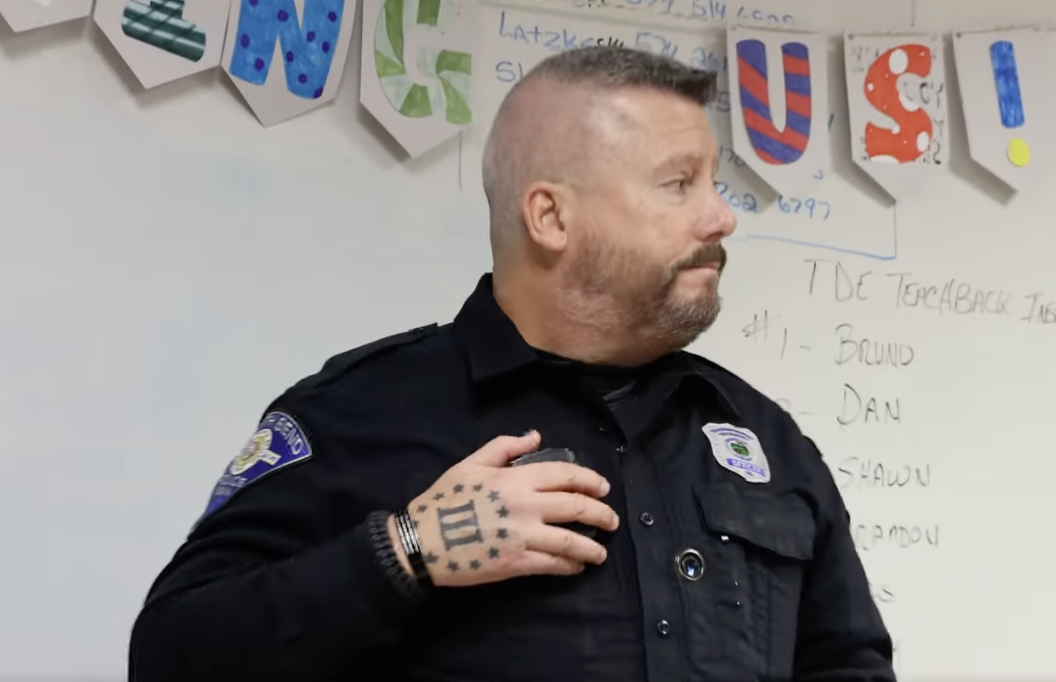South Bend mayor says he's shifted his view on militia group; election foes weigh in

SOUTH BEND — Mayor James Mueller says further reading he did about the Three Percenters has changed his view of the militia group, which he now condemns.
Debate surrounding a retiring South Bend police officer's problematic tattoo led Mueller and his opponents in this year's mayoral race to discuss with The Tribune how to enforce the department's ban on offensive symbols.
Exclusive:Retiring South Bend officer says tattoo not connected to extremist group
The South Bend Police Department's policy, updated in July 2021, allows tattoos but bans any that are "obscene, or advocate sexual, racial, or ethnic discrimination." Tattoos also cannot exhibit "gang, supremacist, or extremist group affiliation." The ban applies both in and out of uniform.
"This policy has a lot of room for subjective interpretation of what would classify as an extremist group," Mueller told The Tribune during a phone call Friday.
Mueller's comments signal a shift in his own assessment of the Three Percenters, a right-wing militia movement whose emblem is inked on the right hand of a now-retired SBPD officer. A January Facebook post the department made to celebrate the officer's 25-year tenure prompted scrutiny of the tattoo.
In June of 2021, the Canadian government declared the movement a terrorist organization. The Anti-Defamation League and the Southern Poverty Law Center classify the Three Percenters as part of a broader extremist movement. Members have been charged in connection to the Jan. 6 attack on the U.S. Capitol and convicted for a plot to abduct Michigan Gov. Gretchen Whitmer.
Initially, Mueller told The Tribune that "hate group" seemed too strong of a label for the movement. He didn't know much about it beyond some cursory reading, he confessed.
The next day, after The Tribune published a story in which a Board of Public Safety member and a South Bend Common Council member both said the tattoo shouldn't be allowed, the mayor released a statement at nearly 10 p.m. condemning the Three Percenters as an "extremist hate group."
His opinion changed after more thorough research, he said.
"The Three Percenters have engaged in hateful acts across the country, and extremist groups like them have no place in our city," Mueller said in the Thursday statement.
'How far would you go?'
But, the mayor said, there's still inherent ambiguity in which views count as extremist.
Tolerance for extreme beliefs tends to be higher when the beliefs favor one's personal ideology, he noted. He said the dispute often may come down to the question: "How far would you go?"
Interpreting the policy is even more complicated if an officer and his superiors aren't aware of a symbol's negative affiliations, Mueller said.
Officer Jack Stilp said that when he got the hand tattoo in summer 2021, he didn't know it matched insignia used by the militia movement. Stilp said he considers the symbol a "personal show of patriotism," one he found by searching online for patriotic tattoo ideas.
Innocent or offensive?:Santa image used by South Bend police union puts symbol in spotlight
Mueller said neither he nor South Bend Police Chief Scott Ruszkowski had heard of the Three Percenters before the tattoo was scrutinized.
Such subtlety is why the department used to prohibit visible tattoos, Mueller said. SBPD has struggled for years with a shortage of officers, however, and tattoos seem to be more popular among younger generations. So the policy was grudgingly updated.
"We want to make sure there’s fairness to our employees," Mueller said Friday, "but we also have to be cognizant that whether something is intended or real in the mind of the person getting the tattoo, we have to be careful how we present ourselves as a city to our residents.
"Because we do serve them, because we want them to know that we're here to keep them safe, each and every one of our residents.”
Mayoral opponents weigh in
Republican mayoral candidate Desmont Upchurch said he understands how a controversial symbol, regardless of its wearer's intent, might cause a community member undue distress.
But so long as an officer does the job fairly, Upchurch said, the emblem should serve primarily as a signal to bosses to pay more attention.
South Bend elections:Here's a roundup of the challengers shaking up races for South Bend city offices
“I would want to look at (an officer's) track record, as far as has he had any questionable complaints filed against him," Upchurch said, "to see if he exhibits any biases that could be connected to some of the same biases that we would consider of an extremist group."
“If he's a good officer," Upchurch added, "just because he has this tattoo we shouldn't link him into the negative stereotypes ... or the radical side of that organization.”
Henry Davis Jr., a Democrat who will challenge Mueller in the May primary, said the tattoo seems to be a clear violation of department policy. Darryl Heller, a member of the Board of Public Safety, said the same and called for more scrutiny of political symbols.

"Our administration cannot ignore such blatant signs," Davis said. He added: "People can put on their body whatever they choose to and desire to, but the city has standards and laws. No one gets a pass.”
Upchurch said it's imperative that city officials and the Board of Public Safety, which comprises five mayoral appointees who must approve the hiring and reprimanding of officers, stay abreast of new signs and shifting symbolism.
He called that awareness the "first line of defense" against potential abuses of power.
Heller and Common Council Lori Hamman shared similar thoughts last week, stressing the need to prevent extremist associations, actual or implied, in officers who serve the public.
"We can’t be lazy about keeping up to date new symbols and ideologies," Upchurch said. "The laziness will cost us in the long run if (officers) harm the citizens, and the number one goal is protection of our citizens.”
This article originally appeared on South Bend Tribune: Mayor now says 'no place in our city' for groups like Three Percenters

